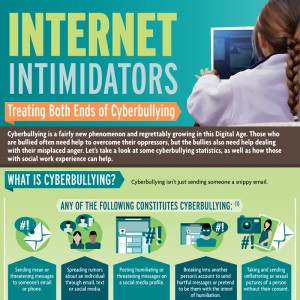Internet Intimidators: Treating Both Sides of Cyberbullying
The relatively new phenomenon of cyberbullying is one that those with social work degrees need to be well-informed about, whether they're trying to help bullying victims or bullies themselves.
What is Cyberbullying?
Cyberbullying isn't just sending someone a snippy email. Any of the following constitutes cyberbullying: (1)
- Sending mean or threatening messages to someone's email or phone.
- Spreading rumors about an individual through email, text or social media.
- Posting humiliating or threatening messages on a social media profile.
- Breaking into another person's account to send hurtful messages or pretend to be them with the intent of humiliation.
- Taking and sending unflattering or sexual pictures of a person without their consent.
The Unfortunate Numbers
50%+
Percentage of adolescents and teens who have been bullied online (1)
10% to 20%
Percentage of adolescents and teens who experience regular cyberbullying (1)
Fewer than 1 in 5
Number of cyberbullying incidents reported to police (1)
1 in 3
Number of young people who have been threatened online (1)
38% of girls who are online report being cyberbullied, compared to 26% of boys. (2)
Treatment for the Bullied
Kids who are regularly bullied online have a high risk for depression, anxiety and, in some serious cases, suicide.
Types of treatment: (3)
- Transactional analysis: This type of therapy deals with connecting past trauma to current issues. Children or adults that still cling to feelings of fear or anxiety due to past bullying may need help overcoming them to deal with the present.
- Assertiveness training: People who are bullied often need help building their confidence to stand up to bullies. This type of therapy helps them learn techniques to do so.
- Cognitive behavioral therapy (CBT): CBT is effective in retraining a person's behavior or thoughts to make a positive change in his or her daily life. Many kids who are bullied tend to develop certain safety behaviors to deal with depression or anxiety, and CBT helps them overcome these.
Treatment for the Bully
Kids who bully often need help with misplaced anger. In some cases, bullies, themselves, are suffering some form of abuse from another bully or a family member.
Types of treatment: (4)
- Anger management: Many people who bully simply have a hard time expressing their anger in a healthy way. Getting to the root of their anger and teaching them relaxation techniques is usually very helpful.
- Psychotherapy: Some bullies are dealing with past or current trauma. Psychotherapy, or "talk therapy," can help discover the origin of their misdirected rage.
- Interventions: Intervening on a bully's behavior is often the most effective way to express the damage that their actions are causing. Sometimes this involves the bully's family and in some cases the bully's victims.
Preventing Cyberbullying: A Guide for Parents
Here are some tips for parents on how to prevent your kids from becoming a victim of cyberbullying. (5)
- Be aware of what your child is doing online. Ask them what sites they visit and who they talk to on social media sites or instant messaging.
- Use parental filter controls on your child's computer.
- Have your own social media profile and "friend" your child so that you can monitor your child's activity.
- Encourage your child to tell you immediately if they are experiencing bullying online. Do not punish them for confiding in you by taking away their computers or devices; simply offer to help mediate or solve the problem.
- Make sure you clearly establish rules regarding computer use. If you make a rule that a child may not have a profile on a certain social media site, follow through.
- Talk with your kids about not sharing passwords and about Internet safety as a whole.
- If you or your child notice signs of cyberbullying, address the issue immediately. Do not let the situation progress or worsen.
Sources:
1. http://www.bullyingstatistics.org
2. http://www.pewinternet.org
3. http://www.counselling-directory.org.uk
4. http://www.schoolmentalhealth.org
5. http://www.stopbullying.gov


